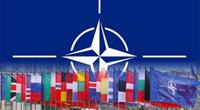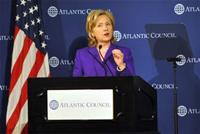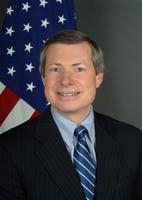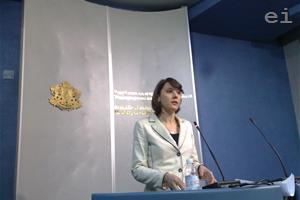NATO is looking for its way into the 21st century
Ralitsa Kovacheva, April 1, 2010
 For the first time since 1999, NATO is revising its Strategic Concept. And for the first time Bulgaria has the opportunity to take part in redefining the goals, strategies and functions of the Organisation.
For the first time since 1999, NATO is revising its Strategic Concept. And for the first time Bulgaria has the opportunity to take part in redefining the goals, strategies and functions of the Organisation.
In a key speech before the Atlantic Council on February 22 the US Secretary of State Hillary Clinton underlined the new, unconventional threats and challenges, that NATO faces: terrorism, cyber attacks, piracy, energy supplies insecurity. These are threats that “have little or no respect for borders. And in some cases, such as cyber attacks, their origins may be unclear.”
Particularly important moment in the new NATO Strategic Concept is the military defense system:
“Missile defense, we believe, will make this continent a safer place. And that  safety could extend to Russia if Russia decides to cooperate with us. It provides an extraordinary opportunity for us to work together to build our mutual security in the 21st century…We need to make Russia a partner in our efforts to prevent nuclear proliferation and in missile defense. We invite Russia to join NATO in developing a missile defense system that can protect all citizens of Europe and of Russia as well. While Russia faces challenges to its security, NATO is not among them. We want a cooperative NATO-Russia relationship that produces concrete results and draws NATO and Russia closer together.”
safety could extend to Russia if Russia decides to cooperate with us. It provides an extraordinary opportunity for us to work together to build our mutual security in the 21st century…We need to make Russia a partner in our efforts to prevent nuclear proliferation and in missile defense. We invite Russia to join NATO in developing a missile defense system that can protect all citizens of Europe and of Russia as well. While Russia faces challenges to its security, NATO is not among them. We want a cooperative NATO-Russia relationship that produces concrete results and draws NATO and Russia closer together.”
Mrs Clinton gave an example of the new challenges the Alliance is facing with energy security by saying:
“Energy security is a particularly pressing priority. Countries vulnerable to energy cutoff face not only economic consequences but strategic risks as well. And I welcome the recent establishment of the U.S.-EU Energy Council and we are determined to support Europe in its efforts to diversify its energy supplies.”
 This exact focus in Hillary Clinton's speech was repeated by the US ambassador in Sofia James Warlick ,at a forum for the energy security in the Black Sea region, organized, again, by the Atlantic Council on March 2. Maybe he chose to say this in Sofia because Bulgaria is among the countries that are too energy dependent on a single energy source and face (together with its partners) strategic risks.
This exact focus in Hillary Clinton's speech was repeated by the US ambassador in Sofia James Warlick ,at a forum for the energy security in the Black Sea region, organized, again, by the Atlantic Council on March 2. Maybe he chose to say this in Sofia because Bulgaria is among the countries that are too energy dependent on a single energy source and face (together with its partners) strategic risks.
Hillary Clinton made it clear that new challenges don't change the fundamental principles of the Alliance:
“And I want to reaffirm as strongly as I can the United States' commitment to honor Article 5 of the NATO treaty. No Ally – or adversary – should ever question our determination on this point....But I am asking that, in addition to honoring Article 5 of the NATO treaty, we reaffirm our commitment to Article 4, where allies pledge to consult together about political and security developments.”
According to Mrs Clinton, NATO needs a reform. Because “a new Concept with old structures will not be transformational”. And she pointed out "that though the topic has received considerable attention from NATO’s defense ministers, it hasn’t been as much of a focus for NATO foreign ministers, but it should be.”
In this regard, the Bulgarian first diplomat Nikolay Mladenov has the unique chance of being a defense minister before, although just for a few months. Perhaps that was the reason why he was invited to take part in a discussion about NATO's future in the framework of the prestigious Brussels forum (March 26-27), organized by the German Marshal Fund. Their visions about the Alliance's future shared also the NATO Secretary General Anders Fogh Rasmussen and former US Secretary of State Madeline Albright, who is chairing the Group of Experts, responsible for the new Strategic Concept.
The theses of the Bulgarian foreign minister were similar to those of Mrs Clinton.  He focused on a missile defense system, that covers all European countries and could restore people's trust in NATO, to convince them that the organization doesn't work on operations only on the other side of the world, but really protects their security. According to Mr Mladenov, the discussions about the new Strategic Concept should not focus only on Article 5 of the NATO Treaty, but also on Article 4, that provides for political consultations as a prevention of threats.
He focused on a missile defense system, that covers all European countries and could restore people's trust in NATO, to convince them that the organization doesn't work on operations only on the other side of the world, but really protects their security. According to Mr Mladenov, the discussions about the new Strategic Concept should not focus only on Article 5 of the NATO Treaty, but also on Article 4, that provides for political consultations as a prevention of threats.
Discussing how the Alliance could manage the challenges with reduced defense funding, Nikolay Mladenov said, that “somewhere a balance between how we really spend our money and how we reinvent the public's belief and trust in Article 5 is perhaps one way of solving it”.
NATO Secretary General Anders Fogh Rasmussen pointed out, that a missile defense system should be build, because Iran has already acquired missiles that could rich ally countries such as Turkey, Greece, Romania and Bulgaria. He offered that the shield should include Russia too:
 “We need a missile defense system that includes not just all countries of NATO but Russia, too. One security roof that we build together, that we support together and that we operate together. One security roof that protects us all…We need a decision by NATO's next summit in November that missile defense for our populations and our territories is an alliance mission and that we will explore every opportunity to cooperate with Russia. But we also need a decision from Russia, a decision to view missile defense as an opportunity rather than a threat.”
“We need a missile defense system that includes not just all countries of NATO but Russia, too. One security roof that we build together, that we support together and that we operate together. One security roof that protects us all…We need a decision by NATO's next summit in November that missile defense for our populations and our territories is an alliance mission and that we will explore every opportunity to cooperate with Russia. But we also need a decision from Russia, a decision to view missile defense as an opportunity rather than a threat.”
The discussion about the future of NATO moved for a while in Sofia, although in a more modest configuration. Special guests to the forum were members of Madeleine Albright's group of experts on NATO‘s new Strategic Concept: Professor Adam Rotfeld, former Foreign Minister of Poland and international security researcher, and Ambassador Yannis-Alexis Zepos, Secretary General of the Greek Ministry of Foreign Affairs and former permanent representative of Greece to NATO. They arrived in Sofia to discuss views on the Alliance’s new Strategic Concept with the Bulgarian authorities and the public at large.
As a result of the discussion among politicians, NGOs and journalists, Bulgaria would draw a non paper, that would represent Bulgaria's contribution to the new Strategic Concept. According to Sofia, the priority issues should be: a strategic balance between Article 5 and non-Article 5 operations under the Washington Treaty; preserving the Transatlantic link as a constructive consultation forum on both sides of the Atlantic; persistence of NATO’s commitment in the Balkans; maintaining the Alliance’s open door policy; perceiving the Black Sea region as an integral part of the Euro-Atlantic Community; maintaining partnerships at the core of NATO’s modern paradigm; driving relations with Russia toward a broad, long term and constructive cooperation; NATO’s active political role in energy security, etc.
 Asked by euinside, shouldn't the Balkans be a priority area for the European Union, the Foreign Ministry Spokeswoman Vessela Tcherneva said, that NATO and the EU had complementary roles. NATO has unfinished business in the Balkans, she explained. And that this refers to both the enlargement of the Alliance and to its adequate presence in the region. NATO is a security guarantee, its presence in the Balkans and the inclusion of many countries as members is one side of the euro-integration process, the other is membership to the European Union, Mrs Tcherneva added.
Asked by euinside, shouldn't the Balkans be a priority area for the European Union, the Foreign Ministry Spokeswoman Vessela Tcherneva said, that NATO and the EU had complementary roles. NATO has unfinished business in the Balkans, she explained. And that this refers to both the enlargement of the Alliance and to its adequate presence in the region. NATO is a security guarantee, its presence in the Balkans and the inclusion of many countries as members is one side of the euro-integration process, the other is membership to the European Union, Mrs Tcherneva added.
The discussion about NATO's future in the 21st century, after the end of the Cold war and in the face of the new global challenges, will continue. The only sure thing here is that the less it comes to weapons the more it comes to values. Because in a world of insecurity and ambivalence, it will depend on values whether to pull the trigger.